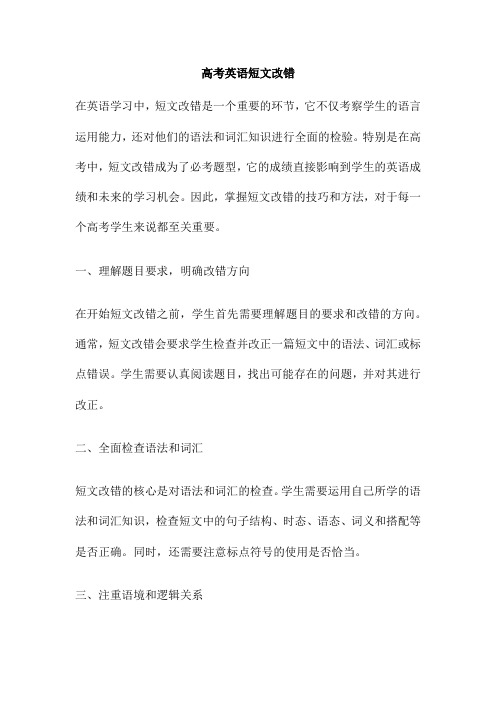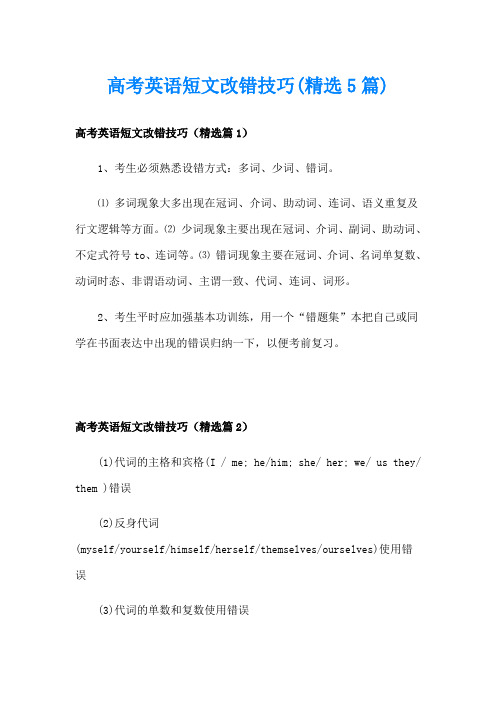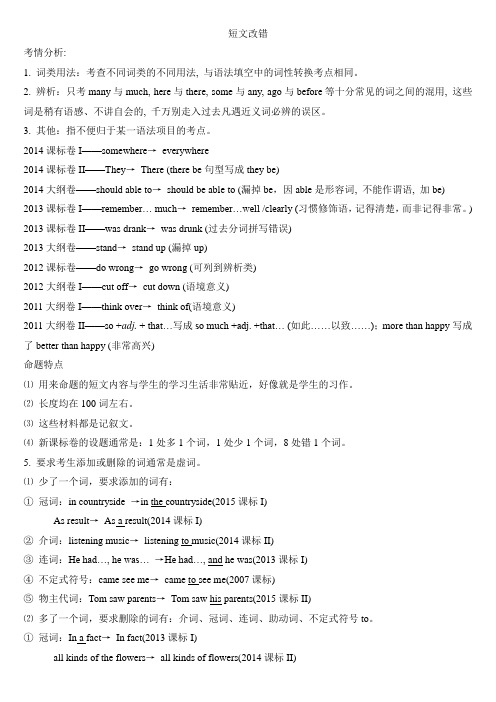高考英语专项复习指导-短文改错
高考英语短文改错做题思路与方法训练五含解析

短文改错做题思绪与方法训练五短文改错口诀:修正不过八,一删一添加。
触及各种词,得分人人夸。
一句一句查,次要查语法。
考点心中记,改正按方法。
To read successfully requires correct ways for reading. Here are some suggestions1.Choose books which are either too difficult nor to easy for you. If you find it too hard to goonwith the book, just put it aside for moment and change for an easier one.2.Choose books that not only interest you and also benefit you, for reading is not always for fun only.3.Some books are to be read roughly, but some must be read slowly and careful. Don’t forget to take some note whenever you feel it necessary.4.Don`t be shy to ask questions. Anyone who know more than you do can be your teacher.5.Make good full use of dictionaries, for dictionaries are their best teachers.命题思绪:此短文取材很合适于短文改错,这篇命题中考查的覆盖面比较全,考点分布比较均匀,命题比较简单。
答案解析与解题点拨:1. 此处要表达的是“浏览的正确方法”,该当用ways of…,所以把for改为of。
(完整版)高考英语专题短文改错二十篇1-20(附答案)

1. Three friends and I was driving on a highway. While we were going at least 50 miles per hour,we passed over a car。
It had broken down, stopped on the side of the road。
My friend slows down, and pulled behind the other car。
He got out of the car immediate and before I knew it he was helping the other person push the car down the road to a spot where wasn't so close to the passing cars. From the way they were pushing the car, it looked as if my friend was pushing them all by himself. I thought my friend help a complete stranger like this was a great thing,but I won't forget his good nature or character。
2. Dear Brad,I’m very glad to hear from you。
In your last letter you ask about the post—80s in China. Actually I am the boy who belongs to this group. Comparing with our parents, life for us is getting much hard. The job market is tough and the house is expensively to afford。
高考英语短文改错题型 解题方法指导 (1)(共45张PPT)

2. Hard work have made him very ill. 解:主语和谓语在数上的一致性。本句 的主语Hard work是不可数名词,谓语 动词应用单数,应将have改为has。
十、非谓语动词。
1. Have tea in the late afternoon provides a bridge ...
解:动词-ing形式短语作主语。provides在句中 作谓语,其前面的部分是主语,应将Have改为 Having。 2. Felt hungry, we built a fire by the lake and
barbecued the fish. 解:动词-ing形式短语作原因状语。we和feel是 主谓关系,应将Felt改为Feeling。
1. ... it had a connection by the British porcelain (瓷器) industry.
解:介词的用法。表示“和……有关系”用介词 with或to。by表示“被;凭借;经由;由于”。 故应将by改为with或to。
2. Every day, he spends too much time with his
5. 看到固定短语、词组时,要检查副词、介 词、冠词等是否有使用错误或缺失。
短文改错涉及面广,综合性强,但是 有一定的规律性。 一、冠词。主要考查冠词表示泛指、特指 的用法及固定搭配中冠词的使用。
1. ... and fish was caught. 解:不定冠词。“一条鱼被抓住了”。fish 在本句中是单数可数名词,是泛指,故在 前面加不定冠词a。
面的整个句子,并用逗号与后面的句子分开, 这里应将Interesting改为Interestingly,表示 “有趣的是”。类似的副词还有surprisingly, naturally, hopefully, normally等。
高考英语短文改错

高考英语短文改错在英语学习中,短文改错是一个重要的环节,它不仅考察学生的语言运用能力,还对他们的语法和词汇知识进行全面的检验。
特别是在高考中,短文改错成为了必考题型,它的成绩直接影响到学生的英语成绩和未来的学习机会。
因此,掌握短文改错的技巧和方法,对于每一个高考学生来说都至关重要。
一、理解题目要求,明确改错方向在开始短文改错之前,学生首先需要理解题目的要求和改错的方向。
通常,短文改错会要求学生检查并改正一篇短文中的语法、词汇或标点错误。
学生需要认真阅读题目,找出可能存在的问题,并对其进行改正。
二、全面检查语法和词汇短文改错的核心是对语法和词汇的检查。
学生需要运用自己所学的语法和词汇知识,检查短文中的句子结构、时态、语态、词义和搭配等是否正确。
同时,还需要注意标点符号的使用是否恰当。
三、注重语境和逻辑关系短文改错不仅仅是检查语法和词汇的正确性,还需要注意语境和逻辑关系。
学生需要理解短文的主题和内容,检查每个句子是否符合逻辑和语境。
如果一个句子存在逻辑或语境上的错误,那么就需要对其进行改正。
四、练习和总结要提高短文改错的能力,学生需要进行大量的练习。
在练习中,他们可以不断发现自己的问题并加以改正。
学生还需要对自己的错误进行总结,找出错误的规律和原因,以便在未来的学习中加以改进。
高考英语短文改错是考察学生语言运用能力的重要方式。
学生需要通过理解题目要求、全面检查语法和词汇、注重语境和逻辑关系以及大量练习和总结等方法,提高自己的短文改错能力。
只有这样,他们才能够在高考中取得优异的英语成绩,为未来的学习和职业生涯打下坚实的基础。
短文改错是高考英语试题中一种非常重要的题型,它主要考查考生对英语短文的理解和运用能力。
短文改错中的错误通常包括拼写错误、语法错误、词汇使用不当等,需要考生具备扎实的英语基础和敏锐的语感。
考生应该注意短文中的拼写错误。
拼写错误包括单词拼写错误、大小写错误等。
这类错误需要考生仔细阅读短文,注意单词的正确拼写和大小写。
高考英语短文改错技巧(精选5篇)

高考英语短文改错技巧(精选5篇)高考英语短文改错技巧(精选篇1)1、考生必须熟悉设错方式:多词、少词、错词。
⑴多词现象大多出现在冠词、介词、助动词、连词、语义重复及行文逻辑等方面。
⑵少词现象主要出现在冠词、介词、副词、助动词、不定式符号to、连词等。
⑶错词现象主要在冠词、介词、名词单复数、动词时态、非谓语动词、主谓一致、代词、连词、词形。
2、考生平时应加强基本功训练,用一个“错题集”本把自己或同学在书面表达中出现的错误归纳一下,以便考前复习。
高考英语短文改错技巧(精选篇2)(1)代词的主格和宾格(I / me; he/him; she/ her; we/ us they/ them )错误(2)反身代词(myself/yourself/himself/herself/themselves/ourselves)使用错误(3)代词的单数和复数使用错误(4)代词指代错误(5)多代词或少代词Soon I began to enjoy talking to myself on paper as I was learning to express me in simple English. (me 改为 myself ) One day I wrote a little story and showed to my teacher. (to 前加it)If any one of us had any difficulty in our life and study, the other would help him out. (other后加s)What’s more, you have to be friends with your pupils and take good care of him. (him改为them)高考英语短文改错技巧(精选篇3)(1)不定式、动名词作主语、宾语时(2)and 连接的不定式或动名词前后不一致(尤其距离较远时)(3)介词后用动名词形式作宾语;某些动词后要求接动名词或不定式高考英语短文改错技巧(精选篇4)学生应把改错内容当作一篇小短文来理解,这样能对短文有个宏观把握,对上下文有全面的了解。
最新-高考英语 高考短文改错指导及分析 人教版 精品

短文改错指导短文改错满分为10分,分数不多但是每一分都很关键。
很多同学在做此题时会遇到以下几点困惑:第一、拿过题来不知如何下手;第二、特别是在读不懂文章的时候,或丢掉不做或草草了事,得分率很低。
面对以上两个主要困惑,笔者认为从有效掌握解题思路和熟悉出题规律,以及破解题目关键两大处入手,此类题目就会迎刃而解,为你高考的成功之路再添一股强有劲的动力。
解题思路(三步解题法):第一步、快速浏览全文,把握文章的主要时态、人称及文章的主旨大意,顺便标记自己一眼就能看出的错误。
第二步、细读文章的每一句话。
一般要结合文章的前后句以及出题规律来做题。
第三步、代入已经修改完成的答案通读全文,看其是否通顺。
注意:在修改过程当中,一定要相信自己的第一感觉。
即一般来说,第一次填写的答案正确率比较高,没有十足地把握不易轻易改正!二、出题规律以及破解关键:高考短文改错出题人一般会在以下八个方面进行出题。
掌握出题规律之后做题便会事半功倍!1.动词:(1)主要考察能力:时态、主谓是否一致、固定搭配。
(2)出题形式:①时态混用ie, Thenthe trouble started. We can not open the door.So we askedthe policemanfor help.讲解:很显然此句子主时态是一般过去式,因此应把can改为could。
②主谓不一致ie, There were a football game on TV last Saturday evening.讲解:原句中a football game决定了谓语动词必须用单数,所以应该把were改为was。
③固定搭配ie, I have given up somke. The dog doesn’t like the smell.讲解:give up doing sth。
因此动词somke应该改为somking。
2.名词:(1)主要考察能力:单复数混用。
高考英语:短文改错知识点总结解题指导及训练(含答案)

短文改错考情分析:1. 词类用法:考查不同词类的不同用法, 与语法填空中的词性转换考点相同。
2. 辨析:只考many与much, here与there, some与any, ago与before等十分常见的词之间的混用, 这些词是稍有语感、不讲自会的, 千万别走入过去凡遇近义词必辨的误区。
3. 其他:指不便归于某一语法项目的考点。
2014课标卷I——somewhere→everywhere2014课标卷II——They→There (there be句型写成they be)2014大纲卷——should able to→should be able to (漏掉be,因able是形容词, 不能作谓语, 加be) 2013课标卷I——remember… much→remember…well /clearly (习惯修饰语,记得清楚,而非记得非常。
) 2013课标卷II——was drank→was drunk (过去分词拼写错误)2013大纲卷——stand→stand up (漏掉up)2012课标卷——do wrong→go wrong (可列到辨析类)2012大纲卷I——cut off→cut down (语境意义)2011大纲卷I——think over→think of(语境意义)2011大纲卷II——so +adj.+ that…写成so much +adj. +that… (如此……以致……);more than happy写成了better than happy (非常高兴)命题特点⑴用来命题的短文内容与学生的学习生活非常贴近,好像就是学生的习作。
⑵长度均在100词左右。
⑶这些材料都是记叙文。
⑷新课标卷的设题通常是:1处多1个词,1处少1个词,8处错1个词。
5. 要求考生添加或删除的词通常是虚词。
⑴少了一个词,要求添加的词有:①冠词:in countryside →in the countryside(2015课标I)As result→As a result(2014课标I)②介词:listening music→listening to music(2014课标II)③连词:He had…, he was… →He had…, and he was(2013课标I)④不定式符号:came see me→came to see me(2007课标)⑤物主代词:Tom saw parents→Tom saw his parents(2015课标II)⑵多了一个词,要求删除的词有:介词、冠词、连词、助动词、不定式符号to。
高考英语总复习短文改错练习8篇(有答案)

高考英语短文改错专练8篇AMy mom and I were out driving when we saw a car ahead of us slow down sudden and then came to stop as it reached the side of the road. We pulled over and asking the woman inside the car if she needed any helps. She said “Yes, please!” Since we were right next by a parking lot, we tried to push her car into it. We weren’t very successful, as it is a heavy car. Then a man and his kids came over and offered his help as well as! Together we got the woman’s car into the parking lot, which she was safe and could get the help she needed. We both smiled at each other and then went on our way.BOne morning when I took the bus to meet a friend in town. When I boarded, a young foreigner rushed catch the bus and just made it right behind me. I pay my fare, and started looking for the seat, when I heard the young man ask the bus driver whether he could change a 50-yuan bill for his ticket. I already knew it was possible, as it was writing on the fare box. Being told the driver didn’t have enough changes, the young man seemed verydisappointing. I told him I was going to pay his fare. He was relieved and thanked me. Dig in his pocket, he found one euro and insisted on giving it to myself. We both made it into town.CI was in the supermarket queue yesterday when the member of staff came to me and directed me to a checkout where had just opened. When I arrived, the cashier was allowing a little girl to scan through the shopping. My first thoughts were that I’d have got served much quick if I’d just stayed where I was. Eventual it was of my turn. The cashier was sweet and apologized for the delay. We chatted as she packed up my items. Then she explained me that the little girl, a customer from a few days ago, had lost her purse. She, like a cashier, paid for his shopping. And the girl just came to return the money but volunteered to help.DThere was one class that I think I will never forget. It was the piano class. In the last class of that term, each student was required play two tunes on the piano, according to that the teacher, a pretty lady, was going to give us marks. Soon it wasmy turn. In spite of all the prepare I had done, I was still very nervous. I say at the beginning, “Although as a new learner I don’t play well, but I want to express my lov e to my parents through the two tunes.” Lucky, everything went all right. But the teacher commented, “Actually, Julie, you did great! Therefore, I will just give you 9.5, hopes that you will always remember to believe in yourself.” His words are still remi nding me to be self-confident.ETime and tide wait no man. This is everything I learned last year. I have spent so much time fool around that my grades began to suffer. I finally realized that something had to be done. It was time to changing. Now I have a new plan for using my time wise. I have set my alarm clock half a hour ahead. This will give me a head start every day. I have also been decided to keep a record of what I do and when I do it. Look back on which I’ve done will give me some ideas on how to manage my time.FI love English and I do hope that someday I can watch English movies without any difficult. However, it’s never easierto learn about a foreign language. And English is exception. Recently I find it very difficult to remember new words. Therefore, I turned to my teacher for help yesterday. She said the best way to learn new words are to read and use it as often as possible. I think she was right, because we can surely remember a person if seeing every day. Therefore, I had decided to read at least one English article and write a diary with English every day from now on. Hopefully, I will make great progress by the end of a year.GLast Sunday, I went shopping with Mom in the town. I was kind of excited because it have been years the last time I went shopping with her. I followed Mom into a small store sells farm chemicals and seeds. As soon as I stepped into the store, I was surprising by so much singing birds flying freely. Then I noticed there had at least 30 nests in total on the walls and under the ceiling! I turned to the owner, an old man, and told him what amazing it was. He said delighted that the birds were like his babies and he always left the doors open for it. And at night, when he was away, the birds could come in or out through the broken windows at anytime they wanted.HI have a little cousin which name is Angela. In two months she is going to be two year old. Her name is given by her mother who loves her very much and thinks she is his angel. Angela has beautiful eyes and has learned to count to 20 recently! Read children’s books regularly, she knows many animals and plants. She is also a typical little girl, who loves dolls and every night puts them to sleeping before going to the bed! She is also very impatient and can play a fishing game for over half an hour at a time! Now she can walk well and even run, and she is fond playing with me. I feel lucky to have so a lovely cousin.答案:A1. ... slow down sudden ... sudden → suddenly2. ... came to stop ... stop前加a3. ... asking the woman ... asking → asked4. ... needed any helps. helps → help5. ... right next by ... by → to6. ... it is a heavy ... is → was7. ... offered his help ... his → their8. ... as well as! 去掉第二个as9. ... which she was ... which → where或which前加in10. We both smiled ... both → allB1. One morning when ... 去掉when2. ... rushed catch the ... catch前加to3. I pay my fare ... pay → pai d4. ... looking for the ... the → a5. ... it was possible ... possible → impossible6. ... as it was writing ... writing → written7. ... enough changes ... changes → change8. ... very disappointing. disappoi nting → disappointed9. Dig in his ... Dig → Digging10. ... giving it to myself. myself → meC1. ... the member of staff ... the → a2. ... where had just ... where → which / that3. ... served much quick ... quick → quicker4. Eventual it was ... Eventual → Eventually5. ... of my turn. 去掉of6. ... she explained me ... me前加to或去掉me7. ... a few days ago ... ago → before8. ... like a cashier ... like → as9. ... paid for his ... his → her10. ... but volunteered to ... but → andD1. ... the piano class. the → a2. ... required play ... play前加to3. ... according to that ... that → which4. ... all the prepare ... prepare → preparation5. I say at ... say → said6. ... but I want to ... 去掉but7. Lucky, everything ... Lucky → Luckily8. Therefore, I will ... Therefore → However9. ... hopes that you ... hopes → hoping10. His words are ... His → HerE1. ... wait no man. wait后加for2. This is everything ... everything → something3. I have spent ... have → had4. ... fool around that ... fool → fooling5. ... time to changing. changing → change6. ... my time wise. wise → wisely7. ... a hour ahead. a → an8. ... been decided to ... 去掉been9. Look back on ... Look → Looking10. ... which I've done ... which → whatF1. ... any difficult. dif ficult → difficulty2. ... it's never easier ... easier → easy3. ... learn about a ... 去掉about4. ... English is exception. is后加no5. ... new words are ... are → is6. ... use it as ... it → the m7. ... seeing every day. seeing → seen8. ... I had decided ... had → have9. ... with English ... with → in10. ... end of a year. a → theG1. ... it have been ... have → had2. ... the last time I ... the前加since3. ... store sells ... sells → selling4. ... I was surprising ... surprising → surprised5. ... so much singing ... much → many6. ... noticed there had ... had → we re7. ... what amazing ... what → how8. ... said delighted ... delighted → delightedly9. ... open for it. it → them10. ... at anytime they ... 去掉atH1. ... which name ... which → whose2. ... two year old. year → years3. Her name is ... is → was4. ... is his angel. his → her5. Read children's books ... Read → Reading6. ... them to sleeping ... sleeping → sleep7. ... to the bed! 去掉the8. ... very impatient ... impatient → patient9. ... fond playing ... fond后加of10. ... so a lovely ... so → such短文改错专练(二)假定英语课上老师要求同桌之间交换修改作文,请你修改你同桌写的以下作文。
- 1、下载文档前请自行甄别文档内容的完整性,平台不提供额外的编辑、内容补充、找答案等附加服务。
- 2、"仅部分预览"的文档,不可在线预览部分如存在完整性等问题,可反馈申请退款(可完整预览的文档不适用该条件!)。
- 3、如文档侵犯您的权益,请联系客服反馈,我们会尽快为您处理(人工客服工作时间:9:00-18:30)。
5. Usually at the begin of a meeting, we sang the national song.
beginning 6. When I heard the steps outside,
I hurriedly went up to the window
to see who past by.
4. Today I visited the Smiths ----- my first
time visit to an American family. (time)
1. It is a very important examination but I can’t afford to fail it. so 2. The new person on the job feels better after he and she has played tennis with or other people in the office.
错误类型例析(6)
非谓语动词错误
主要是不定式符号to的多余与遗漏,动名
词作主语和介词宾语时误用原形动词,现
在分词与过去分词的误用等。
6. Mr. Reed made up his mind to devote all he had to set up some schools for poor children. setting using 7. Dr Tichauer has discovered that use the same tools all day long for many years will cause serious illnesses. 8. There was no more buses, they had no choice but to walk home.
3. In some places you can borrow many books as you want. as 4. People in industrial countries can expect to live for twice so long as people who lived a few hundred years ago. as
高考英语专项指导 短文改错
1. She said she and my classmate all wished me success. (classmates) 2. Visiting friends is one of the most common occurrence in our everyday life. (occurrences) 3. I saw your name on a list of teacher who wished to spend their holidays in France this summer. (teachers)
3. We got on the school bus and which took us straight to the it People’s Park.
错误类型例析(3)
代词错误
代词错误主要有人称代词格的误用,不定代 词使用错误,作形式主语与形式宾语it的遗 漏或误用以及代词所指代的内容与先行词在 性和数方面不一致等。
7. Haven’t I made this clear that you
mustn’t spit everywhere?
it
1. I’m sure your illness is caused by something more seriously than overwork. serious 2. The mixture of coffee, milk, and sugar tastes differently from tea. different 3. My hometown has taken on a new look. How great it has changed! greatly seriously 4. He listened to his heart and said there
heard the better voice.
a (The)
8. A few friends he’d made there were all invited to his birthday party.
me 1. Mr. Johnson gave his
friends, Mary and I, a tea party. he/him 2. I have the same idea as his.
passed
1. Do you know what subjects they study while they were at college? studied 2. It was a long time since I saw Tom at my uncle’s and I don’t know where is he’s been these months.
5. The football team has done well this
year. All of their members have trained
hard.
them 6. He designed new tools which were fit
its
for the users when they worked with it.
being
错误类型例析(7)
冗言错误
冗言错误是指受汉语的影响,句中用了多余的 词,造成语义重复。主要有形容词副词比较级 前用了多余的more,动词后接介词或副词造成 语义重复以及句中使用多余的词等。
1. I never knew that a ride down a river could be so much exciting. (much) 2. We must study hard in order to serve for the people better in the future. (for) 3. I hope that both you two could come and visit us some time soon. (both)
(a) 3. The computer is an useful machine that
can do many things for us.
4. A great celebration was held in the (the)
People’s Square on the National Day.
1. As I am inexperienced teacher, I’m afraid have little to say about the subject. (an) 2. One of the students who were sitting in front gave a different answer to the question. (the)
5. Is it true that some Germen will come to visit our school next week? Germans 6. There are so many kinds of computers on sale that we can’t make up our mind which to buy. minds 7. All the woman doctors in the hospital got a present on the eighth of March. women
ห้องสมุดไป่ตู้
was nothing serious wrong with him.
错误类型例析(4)
词性错误
根据词在句中的位置及与其他词的修饰与被修 饰的关系来确定词的正确形式,词在句中不同 的句法功能要求使用相应的词性。词性误用包 括形容词副词误用和其他词性误用。连系动词 后或名词前用形容词,修饰行为动词、形容词 副词、过去分词或整个句子用副词。
5. Many people agree that the knowledge of English is a must in international a trade. 6. He failed but he wanted to try the a
second time.
7. How beautifully she sings! I’ve never
语态错误:是该用被动语态却用了主动语态 或不能用于被动语态的词如happen, take place, occur, sell well, belong to等却用了被动语态。
5. The rule requires that everyone has his bike, new or old, checked once a year. have 6. There by the river sitting an old man who seemed to be fishing. sat 7. You are wet all over. You must have caught in the sudden heavy rain. been
错误类型例析(8)
连词错误
连词(conjunction)错误主要有并列连词and, but, or的误用、固定搭配中的连词使用错误以 及根据上下文的关系连词使用错误等。解题 时要根据词与词、句子与句子之间的关系来 判断连接词的使用是否正确或是否多余或遗 漏,要注意句子结构的完整性。
8. In the summer of 1998, serious floods
were occurred in many parts of China.
